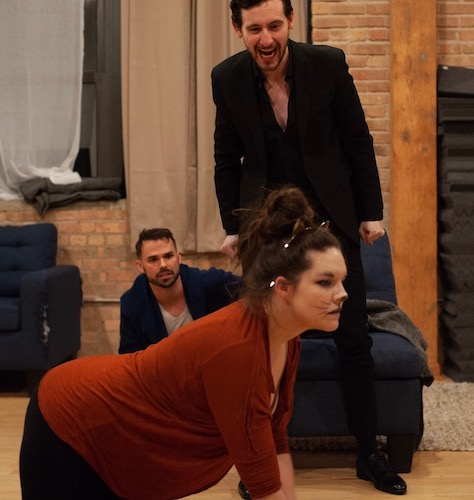Worlds collide with Arendt, Heidegger and a homicidal cat in Thompson Street Opera’s double bill

Based in Chicago since 2016, Thompson Street Opera has a taste for operas new and underperformed — in other words, works that have received their premieres but not much else.
To conclude its season, Thompson Street paired two such fresh-faced works in a trippy double bill: The Hat: When Arendt Met Heidegger (music by Karen Siegel, libretto by Zsuzsanna Ardó) and The Man Who Woke Up (music and libretto by Robin Haigh).
Both works are free-wheeling and ambitious, sometimes to their own detriment. But as its musicians proved again Thursday night in the Athenaeum’s black box theater, Thompson Street continues to put forward consistently solid interpretations of even the most inconsistent works.
Receiving its fully staged and orchestrated premiere with Thompson Street, The Hat imagines the intense first encounter between young philosopher to-be Hannah Arendt (soprano Emelia Clark, played with apt youthful tremulousness) and her professor-turned-lover, Martin Heidegger (the smooth, imposing bass-baritone William Roberts). After the events of the opera, Heidegger became an enthusiastic Nazi, while Arendt, who was Jewish, eventually had to flee Europe for the U.S.
The story is certainly there, but Siegel and Ardó’s one-act misses the mark by trying to do too much. Siegel’s busy score is indebted to the American minimalist school — with repetitive, metrically transforming motifs — but to unclear ends. In the scenes with Arendt and Heidegger, two secondary character roles (mezzo-soprano Liana Gineitis and tenor Matthew Peckham) act as a chorus in a way more intrusive than illuminating, singing ostinatos built from words and sentence fragments. Whether the venue or the writing, these moments often drowned out or muddled the central lovers’ lines, rather than enriching their heady, intimate dialogue.
It doesn’t help that The Hat is hobbled by a libretto that attempts to be cerebral but is mostly just clunky — perhaps unsurprising, given its subject matter. (Lines are mostly lifted or adapted from Ardó’s 2002 play, which was the basis for the opera.) Tellingly, the opera’s most affecting scenes are the ones that directly address the fraught political realities of Heidegger and Arendt’s relationship, rather than orbiting obliquely around it.
Haigh’s The Man Who Woke Up offers a much more lighthearted scenario: A man (baritone Jonathan Wilson) wakes up to discover he’s become a character in an opera, grappling with his loss of free will and, inexplicably, a murderous cat (soprano Angela Born). He must also contend with the cat’s oddball owner (countertenor Eric Schlossberg) and his woebegone wife (soprano Kelsea Webb).
The concept is charming, if at times feeling a bit too much like a string of gags. But unlike the more stoic Hat, Haigh’s score embraces a self-referential approach to its libretto’s unwieldy concept. Vibrant, witty orchestration keeps the farce on its toes; the score cheekily sets polysyllabic words that would otherwise feel shoehorned into a libretto, as they could in The Hat.
Though Haigh’s score was somewhat more forgiving to vocal projection and balance, The Man Who Woke Up occasionally had its own challenges. Without a pit, instrumental ensembles can easily overwhelm singers in the cozy second-floor theater.
Apart from a blown final line, the Thompson Street singers projected well and displayed clear diction. It helped that the cast included two of the biggest voices of the night: baritone Wilson, a Thompson regular who invariably steals every show he performs in, and Webb, whose commanding voice and characterization lent much-needed dimension to her role’s dissatisfied housewife trope.
Both operas were scored for violin, viola, cello, clarinet, and French horn, with the addition of a keyboard for The Man Who Woke Up. Throughout, Thompson Street music director Alex Enyart led the chamber ensemble in tight, intricate, and polished readings.
Thompson Street Opera’s double bill will be repeated 8 p.m. Friday and Saturday and 3 p.m. Sunday. thompsonstreetopera.org.
Posted in Performances




